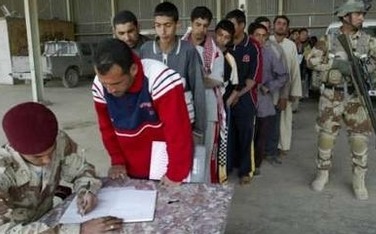UN: Drop in Iraq violence may not last
(Agencies)
Updated: 2008-03-16 10:26
Updated: 2008-03-16 10:26
BAGHDAD -- The influx of thousands of US forces has driven down insurgent attacks in Baghdad, but violence elsewhere in Iraq raises questions about whether killings will continue to drop as American forces begin to leave, the United Nations said Saturday.
As security improved in Baghdad, violent attacks spread last year to other parts of the country, including Diyala Province and Mosul, al-Qaida's last urban stronghold, according to the report from the United Nations Assistance Mission for Iraq.
|
|
"The government of Iraq continued to face enormous challenges in its efforts to bring sectarian violence and other criminal activity under control against a backdrop of political instability," the report, which examined the last six months of 2007, said.
"This is a window of opportunity for Iraq," Staffan de Mistura, the UN chief in Iraq, said at a news conference in Baghdad.
The US military has said a 60 percent reduction in attacks followed the influx of more than 20,000 additional troops, known as the surge. Military officials did not respond to requests for comment.
De Mistura said so-called Awakening Councils, groups composed of former Sunni fighters who have accepted US funding to switch allegiances and fight al-Qaida in Iraq, have played an important role in stopping violence.
Thousands of US forces went to Iraq starting last year as part of a strategy by Gen. David Petraeus, the commander of US forces in Iraq, to secure the capital and give Iraq's politicians breathing room to cut deals that would bring minority Sunni Arabs into the government and weaken the insurgency.
The UN report cautioned against hasty conclusions because "the extent to which the decrease in violence was sustainable remained unclear."
Violent attacks have grown more frequent in recent weeks.
Thirteen US soldiers have been killed in a week, including a soldier who was killed Saturday when he was shot during combat operations in Baghdad. Five others died in a single suicide attack in central Baghdad last week. In a separate attack a week ago, two massive bombs hit Baghdad's Karradah neighborhood, killing 68 people.
With Saturday's death, at least 3,988 members of the US military have died since the beginning of the war in March 2003, according to an Associated Press count.
On Saturday, Iraqi security forces clashed with a breakaway faction of Shiite cleric Muqtada al-Sadr's Mahdi Army in Kut, leaving six dead and 21 others injured, police said on condition of anonymity because they were not authorized to release information. A roadside bomb hidden in a trash can also killed a street sweeper and injured eight others in Baghdad's Karradah neighborhood, a police officer said on condition of anonymity because they were not authorized to release the information.
The US military also said Saturday that Iraqi police, led by an informant, discovered a large weapons cache that included dozens of rockets and mortars, machine guns and parts to build nearly 100 armor-piercing bombs known as explosively formed penetrators, or EFPs, which US officials say come from Iran.
A suicide bomber detonated an explosive vest a day earlier at a checkpoint near the Syrian border, killing an interpreter and wounding six others, including two coalition soldiers, military officials said. No other details were immediately available.
The report, the 12th issued from the UN in Iraq, comes in the wake of the first sizable reduction in troops since a security plan began last year.
Three months ago, US military officials sent home one brigade numbering about 5,000 troops. Further reductions, however, are being delayed for three months so military commanders in Iraq can assess progress.
Violence in the capital has fallen considerably thanks to a maze of walls and barriers that divide Shiite from Sunni neighborhoods, a key Shiite militia's cease-fire and the decision by many Sunnis to turn against al-Qaida in Iraq.
But Iraqi politicians are still gridlocked over sharing power, and citizens appear to have little hope that Iraqi forces could control al-Qaida in Iraq and renegade Shiite militias if US forces continue a drawdown.
The report also raised questions about human rights violations at detainment facilities in Kurdistan, and the conduct of private security firms such as Blackwater Worldwide, which remains at the center of a federal probe following the deaths 17 Iraqi civilians last year.
|
||
|
||
|
|
|
|
